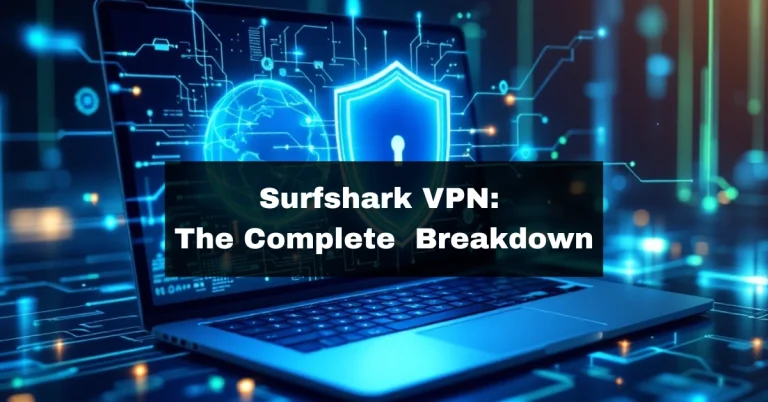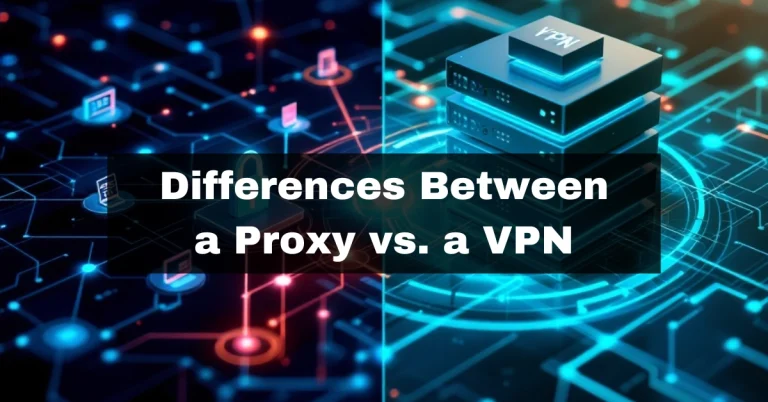A VPN, or Virtual Private Network, is a technology that creates a secure and private connection between your device and the internet.
It encrypts and routes your data through a server, hiding your online activities from prying eyes.

Whether you’re browsing, streaming, or working remotely, a VPN adds a layer of protection and privacy.
In today’s digital world, where data breaches and cyberattacks are common, VPNs have become vital tools for individuals and businesses.
But to truly understand their importance, let’s explore how they work, their history, and why they are essential for a safer internet experience.
How Does a VPN Work?
At its core, a VPN works by establishing a secure “tunnel” between your device and a server elsewhere. This process involves:
- Encryption: Your data is converted into unreadable code, ensuring that only the intended recipient can understand it.
- Tunneling: Your internet traffic is routed through the VPN server, masking your IP address and making it appear like you’re browsing from another location.
- VPN Protocols: Protocols like OpenVPN, IKEv2, and WireGuard control how this secure connection is established and maintained.
A VPN protects data by encrypting and rerouting it, preventing it from being hacked, tracked, or even spied on by the government.
The History of VPNs
Early Networking Innovations (1960s-1980s)
The story of VPNs begins with the development of ARPANET in the 1960s, the first network that laid the foundation for the Internet.
By the 1980s, TCP/IP emerged as the protocol that allowed computers to communicate seamlessly.
These early innovations set the stage for the concept of secure data transmission.
The Birth of VPN Technology (1990s)
In the 1990s, the need for secure communication became apparent as the internet gained popularity.
SWIPE (Software IP Encryption Protocol) and IPsec (Internet Protocol Security) were the first technologies to encrypt data sent over networks.
Around the same time, Microsoft introduced PPTP (Point-to-Point Tunneling Protocol), marking the birth of consumer VPNs.
VPNs in the 2000s
With the rise of cybersecurity challenges in the early 2000s, businesses began adopting VPNs to protect sensitive information.
VPNs enabled secure remote access, ensuring employees could work safely from anywhere.
Consumer VPNs in the 2010s
By the 2010s, internet censorship, geo-restrictions, and growing privacy concerns fueled the demand for consumer VPNs.
Protocols like OpenVPN and WireGuard offered faster and more secure options for users.
VPNs in the Modern Era (2019–Present)
The COVID-19 pandemic accelerated the adoption of VPNs as remote work became the norm.
VPNs are essential for businesses and individuals today, offering security, privacy, and access to restricted content.
Types of VPNs

There are various types of VPNs, each designed to meet specific needs.
Understanding these types will help you choose the best one for your situation.
Remote Access VPN
A Remote Access VPN connects individual users to a private network, such as an office network, over the Internet.
This is used by employees working remotely to access company resources securely.
Site-to-Site VPN
A Site-to-Site VPN links multiple networks, such as business branch offices, into a single secure network.
This is ideal for organizations with offices in different locations that need to share resources.
Mobile VPN
A Mobile VPN is designed for devices frequently switching between networks, such as mobile phones or tablets.
It ensures a consistent and secure connection even when the device moves between Wi-Fi and mobile networks.
Cloud VPN
A Cloud VPN connects users to applications or services hosted in the cloud. Businesses that rely on cloud services like AWS or Google Cloud often use these to secure access to their cloud-based resources.
Hardware VPN
A Hardware VPN is a physical device dedicated to creating and managing VPN connections. Large organizations that require high performance and security often use them.
Dynamic Multipoint Virtual Private Network (DMVPN)
A DMVPN is an advanced VPN designed for large, dynamic networks. It allows multiple locations to connect directly to each other without routing all traffic through a central hub.
Benefits of Using a VPN
Using a VPN offers numerous advantages, especially in today’s digital landscape. Here’s why millions of people and businesses rely on VPNs:
Privacy and Anonymity
VPNs mask your IP address, making it nearly impossible for websites, advertisers, or hackers to track your online activities.
Security on Public Networks
Public Wi-Fi networks, like those in cafes or airports, are notoriously insecure. A VPN encrypts your connection, protecting your data from potential hackers.
Accessing Geo-Restricted Content
It allows you to bypass geographical restrictions on streaming services and websites, enabling access to content from anywhere in the world.
Protecting Remote Work
Businesses use VPNs to secure remote access to sensitive data and systems, ensuring employees can work safely from home or while traveling.
Avoiding Internet Censorship
In regions where governments restrict internet access, a VPN allows users to access blocked websites and communicate freely.
Challenges and Limitations of VPNs
While VPNs offer numerous benefits, they are not without challenges. Here are some potential drawbacks:
Speed Reduction
The encryption and rerouting processes can slow down your internet speed. High-quality VPNs minimize this impact, but it’s still worth considering.
VPN Blocks
Some websites and services actively block VPN traffic. This can limit access to specific platforms even when using it.
Trustworthiness of VPN Providers
Not all providers are created equal. Some free VPNs may log your data or sell it to third parties, defeating the purpose of privacy. Choosing a reliable VPN provider is essential.
How to Choose the Right VPN
Finding the right VPN depends on your specific needs. Here’s what to consider:
- Key Features: Look for strong encryption, no-log policies, and server locations.
- Free vs. Paid VPNs: Free VPNs can be tempting but often have limitations and potential privacy risks. Paid VPNs offer more features and better security.
- Reputation: Research reviews and recommendations to find a provider with a proven security and reliability track record.
- Specialized Needs: If you need it for streaming, gaming, or business use, ensure the provider effectively supports those activities.
The Most Popular VPNs to Consider
Choosing the right VPN is crucial for ensuring your online security and privacy.
Here’s a quick look at some of the most trusted and widely used VPN services and links to learn more about each.
NordVPN
NordVPN is a leading VPN provider known for its blazing-fast servers and strong security features. With a strict no-logs policy and advanced encryption, it’s an excellent choice for streaming, browsing, and staying anonymous online. Sign Up Here!
Surfshark
Surfshark offers unlimited device connections, which are perfect for families or users with multiple devices. It’s affordable, user-friendly, and has features like CleanWeb to block ads and malware. Sign Up Here!
ProtonVPN
The creators of ProtonMail developed ProtonVPN, which strongly emphasizes privacy. It provides high-security standards and an easy-to-use interface, ensuring a seamless experience. Sign Up Here!
IP Vanish VPN
IP Vanish VPN stands out for its high-speed connections and no-logs policy. It’s an excellent choice for users who need a reliable VPN for streaming and torrenting. Sign Up Here!
StrongVPN
StrongVPN lives up to its name with robust encryption and advanced security protocols. It supports over 30 devices and is ideal for remote workers and small businesses. Sign Up Here!
PureVPN
PureVPN boasts an extensive network of servers in over 140 countries, making it an excellent option for accessing geo-restricted content. Its user-friendly interface and reliable customer support make it popular among VPN users. Sign Up Here!
AngelVPN
AngelVPN combines simplicity and security to provide a hassle-free VPN experience. Its fast servers and competitive pricing make it an excellent choice for beginners and budget-conscious users. Sign Up Here!
Ready to enhance your online security? Check out these trusted VPN providers and find the one that fits your needs.
Setting Up and Using a VPN
Using a VPN is simpler than you think. Here’s a step-by-step guide:
Desktop (Windows and macOS)
- Choose a provider and download their app.
- Install the app and sign in with your account.
- Select a server location and click “Connect.”
Mobile Devices (iOS and Android)
- Download the VPN app from the App Store or Google Play.
- Log in and choose your desired server location.
- Tap the “Connect” button to activate the VPN.
Routers and Smart Devices
- Configure your router with your provider’s settings.
- Connect your smart devices to the router to enjoy protection on all connected devices.
Troubleshooting Common Issues
- Ensure your app is updated to the latest version.
- Switch servers if the connection is slow or blocked.
- Check your internet settings for any conflicts.
Legal and Ethical Considerations
VPN use is generally legal in most countries, but it’s essential to know local laws and ethical guidelines.
While VPNs offer privacy and freedom online, their misuse can lead to unintended consequences.
Where Are VPNs Legal?
VPN usage is generally legal in many parts of the world, but certain countries regulate or restrict their use. Here’s a quick overview:
- Legal:
- United States
- Canada
- Most of Europe
- Heavily Regulated or Banned:
- China
- Russia
- North Korea
Check local laws before using a VPN in another country to avoid potential legal issues.
Staying informed will help you use a VPN responsibly and safely wherever you are.
Ethical Usage of VPNs
VPNs should be used responsibly, ensuring that users do not violate the terms of service or engage in illegal activities.
Ethical use includes protecting privacy, avoiding censorship, and respecting intellectual property laws.
VPNs and Data Protection Laws
VPNs can help users comply with data protection laws like GDPR by encrypting sensitive information.
However, choosing a provider with strong privacy policies is crucial to avoid potential conflicts with legal obligations.
Conclusion
VPNs have evolved dramatically since their early days, becoming essential security, privacy, and unrestricted internet access tools.
Whether protecting sensitive data, avoiding geo-restrictions, or working remotely, VPNs offer a simple yet powerful solution.
Choosing the right VPN ensures the best performance, security, and usability balance.
Use this guide to learn about VPN history, functionality, and benefits. Then, explore our trusted recommendations to find the perfect one for your needs.



